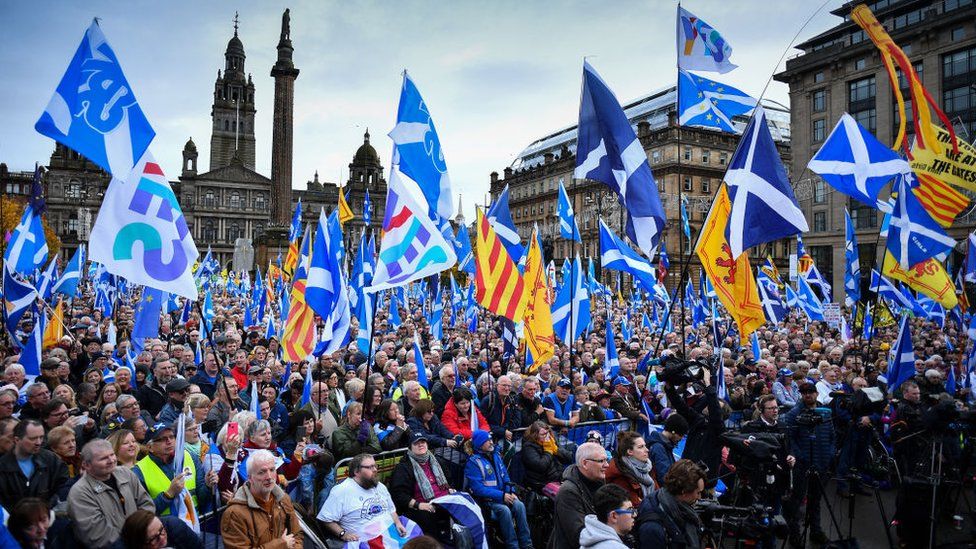ARTICLE AD BOX
 Image source, Getty Images
Image source, Getty Images
Independence campaigners have been hoping for a new referendum since 2014
The UK Supreme Court has ruled that the Scottish government cannot hold an independence referendum without UK government's consent.
First Minister Nicola Sturgeon had said she wanted a vote to take place on 19 October 2023.
Hasn't Scotland already had an independence referendum?
Yes, in September 2014, when Scottish voters were given the choice of staying in the UK or becoming an independent country.
They backed staying the UK by 55% to 45%.
Why is independence back in the spotlight?
In truth, it has never really gone away.
Ms Sturgeon called for another referendum - "indyref2" - immediately after the UK as a whole voted to leave the EU in the 2016 Brexit referendum. Scottish voters backed remain by 62% by 38%.
Independence supporters argued that Scotland should take its future into its own hands, and no longer be tied to the UK and its Conservative government.
Since then Ms Sturgeon has made repeated attempts to push for another vote but there has been no agreement with the UK government.
Image source, PA Media
Image caption,Ms Sturgeon has set out her plans to secure a legal referendum if the UK government does not give formal consent
The SNP currently has a pro-independence majority in the devolved parliament alongside the Scottish Greens. It argues that its electoral success - coupled with the Brexit vote - mean it has a "cast-iron mandate" to hold another referendum.
But the UK government has made clear it has no intention of granting formal consent for a referendum through what is known as a Section 30 order.
This was put in place ahead of the 2014 referendum. Many - but not all - experts believe such a mechanism would be needed again to ensure any vote is legal.
Ms Sturgeon wrote to the then Prime Minister Boris Johnson earlier this year saying she wants a similar agreement this time, but he said no.
Will indyref2 happen?
The UK government argues that the 2014 referendum was, in Ms Sturgeon's own words at the time, a once-in-a-generation opportunity.
Mr Johnson previously suggested that means another one shouldn't be held for about 40 years, with Rishi Sunak - the current incumbent of No 10 - also opposed to a vote.
Image source, PA Media
Image caption,Boris Johnson made it clear he had no intention of agreeing to a second referendum
The UK government has accused the SNP of failing to give clear answers to key questions on issues such as currency and pensions in an independent Scotland. It warns any attempt by Scotland to rejoin the EU would lead to a hard border between the two countries.
Ministers also say Ms Sturgeon and her government should be focusing on recovery from the Covid pandemic and improving public services like health and education.
They argue that an independent Scotland could be "wealthier, happier and fairer", and that people should have the right to choose how they are governed.
So what is Ms Sturgeon's plan?
The first minister has also set out her plans for the way forward without a section 30 order if the UK government's stance doesn't change.
The Scottish government has published a referendum bill which proposes that the vote should take place on 19 October 2023.
Ms Sturgeon said the referendum would be consultative. This means that if there was a yes vote then legislation would have to be passed at both Westminster and Holyrood before Scotland became independent.
The first minister said this meant it would have the same status as the independence vote in 2014 and the Brexit referendum.
Scotland's top law officer, the Lord Advocate, referred the case to the Supreme Court so it can rule on whether MSPs have the power to set up such a referendum without Westminster's backing. The court heard the case on 11 and 12 October.
Ms Sturgeon has previously said that if this happened, the next general election will become a "de facto referendum", with the SNP standing on a single issue of independence.
The UK government said it was not the time to be talking about another independence referendum, and that constitutional matters were clearly reserved to Westminster.
Would Scots vote for independence?
According to polling expert Prof Sir John Curtice, the last half dozen polls have - on average - put support for independence at 49%, with 51% against, once "don't know" votes are excluded.
This suggests that the country hasn't seen the big surge in support for independence that Ms Sturgeon hoped for in the wake of Brexit, the Covid pandemic and Boris Johnson becoming prime minister.
But with such a slender lead in the polls, the pro-UK side cannot be confident of victory, and will be mindful of how support for independence increased before the last referendum.
However, polling has also suggested that there are fewer undecided voters now than there were at the start of the last referendum campaign, so it may be harder for either side to win people over.

 1 year ago
27
1 year ago
27








 English (US)
English (US)